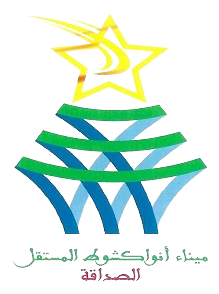The independent port of Nouakchott, known as the Port of Friendship, is a public corporation of an industrial and commercial nature established by Decree No. 87-253 of October 15, 1987.
Although the handling was privatized in 1990, it remained a public facility that is committed to being served by private individuals who have appropriate and effective equipment that guarantees handling of ships in the best conditions in terms of safety, speed, and cost.
Measures have been taken to protect the beach as part of the expansion deal. This involves the construction of a T-shaped spike to restore the formation of the beach sand, and the extension of the protection barrier by five kilometers to prevent the intrusion of sea water into the backlands.
Since the port constitutes the backbone of economic life, its movement has witnessed a steady rise since the start of its activity in 1986, rising from less than 400,000 tons in 1987 3 675 814 tons in 2016, at an average rate of more than +9.52% annually.
As for container transport, it increased from 56,448 twenty-foot containers in 1988 to approximately 134,413 twenty-foot containers in 2016.
Keep pace with the country's economic development
In an effort to keep pace with the country's economic development and to anticipate the needs in the field of port infrastructure, on June 30, 2014, the expansion works of the berthing facilities were completed, the cornerstone of which was laid by His Excellency the President of the Islamic Republic of Mauritania, Mr. President of the Islamic Republic of Mauritania, Mr. Mohamed Ould Abdel Aziz, on August 3, 2014.
Thus, the port of Nouakchott now has three berthing centers on the dredged beach at a depth of -12m that can receive ships carrying third-generation containers and tanks with a tonnage between 35,000 and 40,000 cubic feet (heavy cargo) and a floating dock for ships with a heavy load of less than 10,000 feet. Cube, which raises the number of centers to 7 instead of 3 previously.
In the same context, studies have been completed to establish a dock for containers in the medium term.
Ensuring the continuity of exploitation of historical facilities
To ensure the continuation of the exploitation of the historical facilities (Pier Centers 1, 2, and 3), important works were carried out to restore and modernize the protection of their foundations and foundations with steel columns and reinforced concrete, with self-financing in 2011 and 2013.
The construction of the barrier to protect the water inlets and the port basin from sand sedimentation has also been completed, as well as the dredging works.
Improving the services provided to ships and enhancing the safety and security of port facilities
In an effort to improve the services provided to ships and to enhance the safety and security of port facilities, on the occasion of the fiftieth anniversary of national independence (November 2010), pilot boats were operated and a system for access control with cameras was launched. In 2015, a tug to tow ships with a capacity of 3300 horsepower was acquired, all at the expense of the port.
There were other achievements, including modernization and strengthening the ability to process port information with self-financing as well, and this system was completed in 2011.
It is also planned, within the framework of the strategy adopted to diversify services and improve the safety of navigation in the port's waters, the use of the service for the passage of ships in the near future.
It should be noted that the port of Nouakchott has resumed most of the operations related to the transport of reinforced concrete materials that in the past avoided transit through it. In this regard, the port seeks to raise its competitiveness to be more attractive than the ports that are likely to compete with it.
In the first half of 2016, measures were taken to improve the services provided to port operators. Handling operations are greatly accelerated, and docking times for vessels, especially container carriers, are reduced. Among those measures:
- Organizing corridors and clearing them of everything that obstructs the means of movement;
- Abolishing the weighing of containers, which is no longer resorted to except occasionally when required by temporary control.
In light of this dual task of strengthening the foundations of the port and opening up future prospects, the following projects were launched:
- The specialized petroleum berth project;
- Creation of a quality control directorate;
- Create an area for transferring materials from one container to another;
- Establishment of a port road station.
A representative office was also opened to develop exchange with the Republic of Mali.







